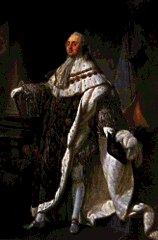Towards the end of the 18th century the
situation in France became desperate. It led to the outbreak of the French
Revolution in 1789, which completely changed the political face of the
world.
Many conditions made France ripe for revolution.
![]()
Towards the end of the 18th century the
situation in France became desperate. It led to the outbreak of the French
Revolution in 1789, which completely changed the political face of the
world.
Many conditions made France ripe for revolution.
![]()
Inefficient
Government
There was deep dissatisfaction
with the way in which France was governed. In the 17th century King Louis
XIV had become an absolute monarch. But during the reign of his great-grand,
Louis XV, the kings power declined. When Louis
XVI came to the throne in 1774 the country was filled with discontent.
He soon proved incapable of running the despotic administration he had
inherited. He was dominated by his pleasure-loving queen, Marie Antointte.
They lived in great luxury at the Palace of Versailles, surrounded by their
nobles and caring little for the problems and suffering of the French people.


The main weakness of the government lay in finance. It had a huge national debt. This was caused by extravagant spending and by fighting the long series of expensive wars over the last 50 years.
Class Inequality
There was much inequality
among the different classes in France. The nobles and the clergy had kept
certain privileges given to them during the Middle Ages. Among other privileges
they were exempt from paying taxes. The nobles owned much of the land in
the country, but they spent most of their time away from their estates.
They spent many hours at the King’s palace. Their grand and rich way of
living contrasted sharply with the condition of the peasants, who scarcely
had enough money to buy food. The nobles and their ladies had much money
to spend on extravagant clothes.
In contrast, the peasants lived in poverty and misery, for the tax burden fell heavily on this group. About 70 per cent of their income was taken up by taxes. Their condition was made worse by rising prices.
The rising middle class, made up of traders and other professionals, was not at all pleased with the inefficient government. This class had become as rich as the nobles. Yet it had no social privileges and was given no high positions in the government.
Opposition
Voltaire and other writers
of the Enlightenment considered that the French political structure was
wrong. They helped to weaken confidence in the existing order. The American
Revolution also increased opposition against the government. The French
government had helped the Americans against Britain. On the one hand this
war expense had a shattering effect on the finance of the government. On
the other hand, ideas of liberty and representative government fired the
imagination of the French and encouraged them to rise up against their
rulers.
![]()